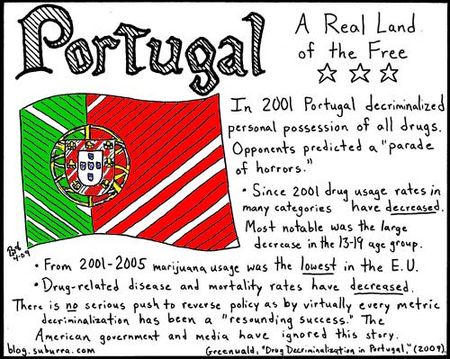In this five-part series, Greg Olear talks with Katie Arnoldi about how U.S. policies on marijuana and immigration are detrimental to our nation’s health. Click here to read from the beginning.
[GO]: Immigration reform, happily, looks like it will happen—perhaps as soon as this week. Obama and the Democrats support it already, and the Republicans, who seem to recognize their fate if they fail to attract the Hispanic vote, have political incentive to get something done. Marco Rubio, who is mentioned as a possible candidate in 2016, has already come out in favor of reform, and he grasps the complexities of the problem. On the conservative blog Red State, Rubio writes: “We need a functional guest worker program so that, in times of low unemployment and rapid economic growth, our industries have the labor they need to continue growing. And we need an agricultural worker program that allows our growers to contract the seasonal and year round labor they need legally.”
The question is, what would a Republican immigration plan look like?
Charles Krauthammer, a prominent conservative commentator with the Washington Post, has been advocating the same plan for years: “a prosaic, low-tech fence.”
Of the kind built near San Diego (triple-layered) that resulted in an astounding 92 percent drop in apprehensions. Like the Israeli fence built along the West Bank that has reduced terrorist infiltration to practically zero.
There’s a reason people have been building fences for, oh, 5,000 years. They work.
The current Senate proposal must be improved, either in the Senate or by the House. It’s not complicated. Build the damn fence. And give “probationary legal status” to the 11 million — not on the day the bill is signed but on the day the fence is completed. Have the president drive in the golden fence post at Promontory Point II and sign the amnesty right there. Great photo op.
[KA]: See, I think he’s missing a big point here. It is impossible to SEAL that border and even if you could, there are other ways in such as, THE OCEAN. People will keep coming if there is opportunity. Illegal immigration is a symptom of a bigger problem. If we crack down on the hiring of undocumented workers, then we eliminate the incentive to come. That is one of the very first things that should be addressed, in my opinion. It’s part of Obama’s four-step process.
[GO]: Rubio seems to understand this, although he’s been predictably attacked by the likes of Newt Gingrich, Erik Erikson of Red State, Michelle Malkin, and Ann Coulter. What would you do, Katie, if you were in charge?
[KA]: Obviously we have to change our immigration policies, and I’m very encouraged by the president’s proposal. I think it is essential that we address the millions of people who are living and working here illegally and give them an opportunity to change their status. We need to forcefully crack down on companies who hire undocumented workers and make sure that all the jobs in this country go to people who are here legally. And then of course we have to instigate a functional guest worker program that allows people from Mexico and other countries to come and work here temporarily. In my opinion, this is one of the most important components of immigration reform.
[GO]: Anything coming from either side that you find troubling?
[KA]: I’m concerned about the big push for increased border security. In 2007, President Bush doubled the size of the Border Patrol. Today we have over 21,000 officers, 18,500 of them posted along our southern border. In order to grow the agency so quickly, the Department of Homeland Security relaxed job requirements. For instance, you no longer need a high school diploma to be a U.S. Border Patrol agent, and polygraph tests are no longer mandatory for every candidate. Every other law enforcement agency in our country requires, at the very least, a high school diploma or equivalent certificate of education. I worry about the quality of agents working along our borders. In the last two years there have been 18 deaths at the hands of the BP and countless complaints about excessive use of force. Because the Border Patrol operates under the Patriot Act, they are not subject to the same scrutiny as other law-enforcement organizations. It is not possible to access their use-of-force policy, which is disturbing. I am really concerned that they function with such little public oversight. In fact, I think the lack of transparency is really scary.
[GO]: Everything about the Patriot Act is scary. Even its name, which implies that dissent is somehow un-American.
[KA]: The other thing I need to say here is that building more walls isn’t going to completely stop illegal traffic. I’ve been all over that border, and there are areas that simply can’t be fenced because of the topography. Cliffs and drop-offs, gullies, rivers. You CANNOT seal all 1,969 miles. It’s impossible. And even if you could, there are oceans and rivers. Airplanes. If there’s a will, there’s a way. So you have to address the reason for illegal cross-border traffic. Immigration reform will help stop the flow of illegal immigrants but it won’t do anything to stop the drug smuggling operations. For that we need to change our drug laws.
[GO]: That seems like a no-brainer, and yet there is fierce opposition, on both sides of the aisle. How did we get here, anyway?
[KA]: On July 17, 1971 Richard Nixon gave his famous “War on Drugs” speech, in which he stated that drug abuse was “public enemy number one.” Over 40 years later I think we can all agree that the War on Drugs has been a colossal failure. Today, in spite of the billions of dollars we’ve thrown at drug enforcement and the hundreds of thousands of people incarcerated on drug charges, recreational drugs are more plentiful than ever before. They are cheaper and stronger and a lot easier to get. We’ve spent something like $1.5 trillion on drug prohibition and had virtually no positive impact on drug use and abuse. Instead we’ve fueled the dangerous drug cartels who are fighting an increasingly bloody war for the right to supply us with the intoxicants we so desperately crave.
[GO]: Our drug laws do the opposite of what Nixon intended. They do not work at all.
[KA]: So. We need to legalize marijuana immediately. Legalization and regulation will eliminate the toxic, illegal cartel sites on our public lands and designated wilderness. Legal marijuana will be a huge and possibly crippling blow to the drug trafficking organizations. Government-controlled marijuana puts the criminals out of business. Regulation and taxation will ease our struggling economy and relieve our over-burdened prison system. This is such a no-brainer to me. Legalize marijuana, right this minute.
[GO]: Another thing to throw out there: kids these days do a lot of drugs, and they do them because it’s generally easier for them to score pot than it is to buy beer. That seems counter-intuitive, because alcohol is legal and pot is not, but this is the case. By that logic, legalizing pot might make it more difficult, not less, for minors to get a hold of it.
[KA]: I also think we should discuss decriminalizing other drugs. Substance abuse should be addressed by medical professionals not by the criminal justice system. I vote for treatment as opposed to incarceration.
[GO]: No, no, Katie. If all drugs were legal, everyone in America would immediately run to the drug store, buy angel dust and crack and crystal meth, and go crazy. Doctors would snort coke before doing surgeries. School teachers would shoot up smack during free periods. The entire fabric of our society would rip apart forever! That’s what the Just Say No people tell us, anyway.
[KA]: Portugal decriminalized all drugs in 2000. Skeptics predicted a huge explosion in drug abuse and addiction but now, over twelve years later, we’re seeing that in fact drug abuse numbers have stayed about the same in that country. What’s changed is that people who need help with addiction problems can now get help. Treatment instead of imprisonment is a much more constructive approach to addiction. We humans like our intoxicants. That’s not going to change. We need to come up with a better way to regulate ourselves.
[GO]: Well, there you have it. The reasons for legalizing pot and reforming our immigration policy are manifold: environmental, economic, and social. We should do it to protect our parklands from certain destruction, to prevent toxic poisons from entering the country and the bloodstream of pot smokers, to save our water supply. There are any number of economic benefits: legalizing pot would decrease the massive federal expenditures on drug enforcement, pot-related legal costs, and incarceration, while increasing revenue via taxes on marijuana; reforming immigration would safeguard the migrant labor on which our economy depends. And what we’re doing now empowers the cartels, who grow ever more violent. The current system is not working, period, and must be repaired. To justify it with lies about marijuana being a gateway drug, or illegal immigrants being a drain on our economy, is as dishonest as it is stupid. Put another way, anyone who thinks the War on Drugs is money well spent must be high.






